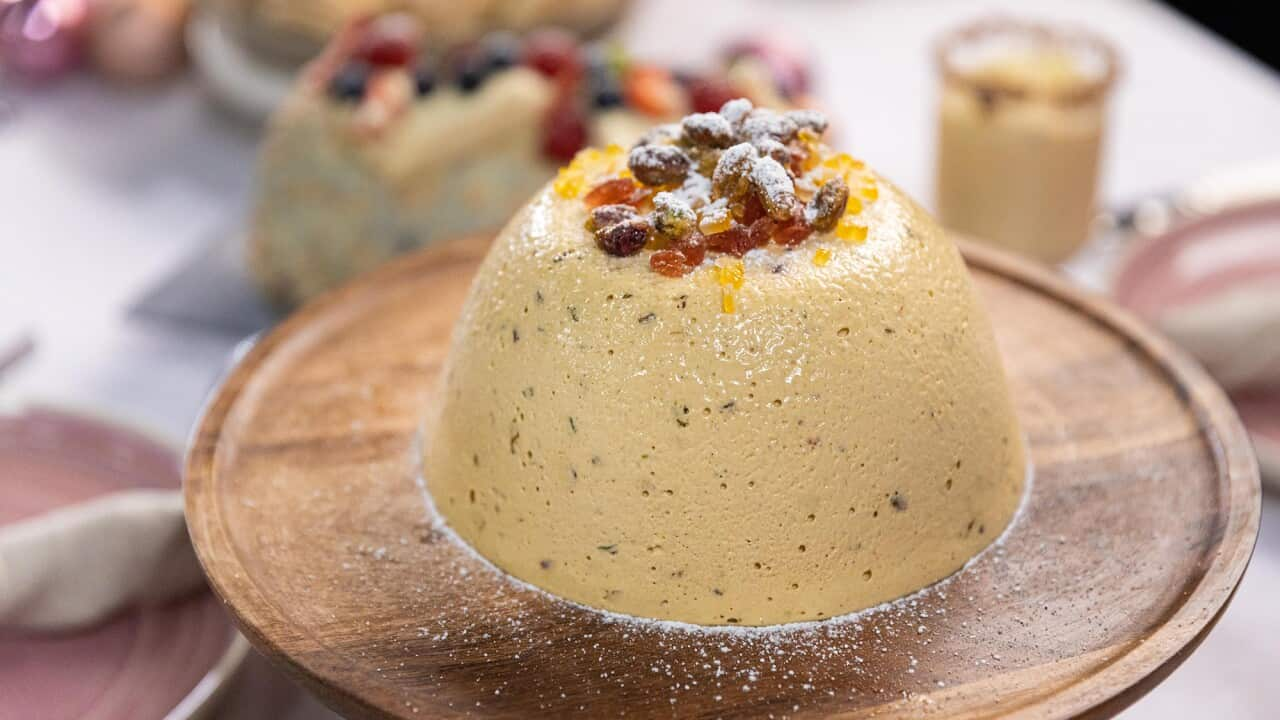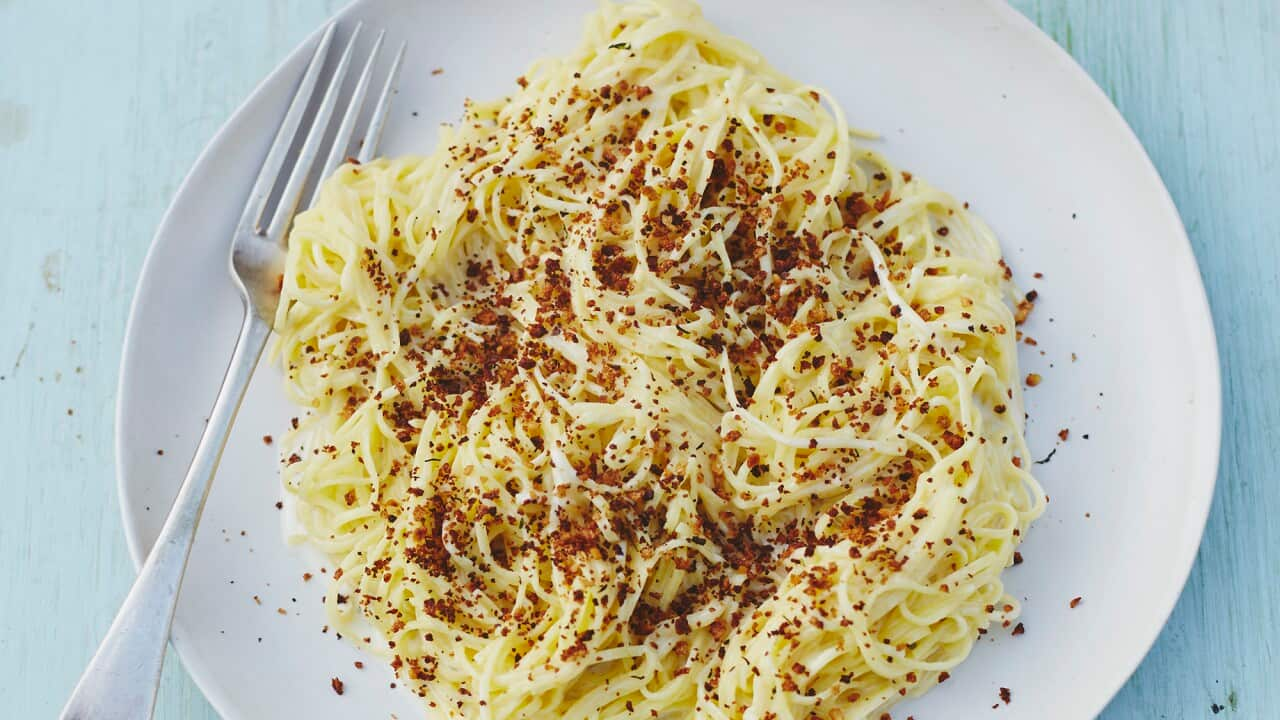serves
6-8
prep
30 minutes
cook
30 minutes
difficulty
Ace
serves
6-8
people
preparation
30
minutes
cooking
30
minutes
difficulty
Ace
level
Ingredients
Kaymak ice-cream
- 450 ml milk
- 6 egg yolks
- 70 g caster sugar
- 250 g kaymak (see Note)
Simit tuille
- 3 egg whites
- 190 g sugar
- 125 g unsalted butter, melted
- 60 g tahini
- 125 g plain flour
- 50 g white sesame seeds
Chocolate soil
- 125 g caster sugar
- 125 g (1 ¼ cups) almond meal
- 75 g (½ cup) plain flour
- 50 g cocoa powder
- pinch of sea salt flakes
- 60 g unsalted butter, melted
Honey curd
- 1 sheet gold leaf gelatine
- 110 g honey
- 150 g unsalted butter, at room temperature
- 1 vanilla pod, split and scraped
- pinch of salt
- 50 ml thickened cream, whipped to stiff peaks
To serve
- thyme flowers and lemon balm leaves, to serve
Freezing/chilling time overnight
You will need to begin this recipe 1 day ahead.
Instructions
To make the kaymak ice-cream, I would normally prepare the anglaise (custard) in the restaurant using a Thermomix. To do so, place the milk, egg yolks and sugar in a Thermomix set to 80°C and blend on speed 4 for 7 minutes. When the time as elapsed, blend on speed 7 for 5 seconds, then pass through a fine sieve into a jug, cool, then refrigerate for 2-3 hours or until chilled.
To make the anglaise the old-fashioned way, bring the milk to the boil and set aside. Whisk the egg yolks and sugar until thick and pale, then slowly pour in the hot milk, whisking continuously. Return the mixture to the pan over medium-low heat. Cook, whisking continuously until the mixture reaches 80°C. Transfer the anglaise to a blender and blend for 10 seconds. Strain through a fine sieve into a jug, cool, then refrigerate for 2-3 hours or until chilled.
Pour the anglaise into an ice-cream machine, add the kaymak and churn according to manufacturers’ instructions. Freeze overnight or until firm.
To make the simit tuille, using a stand mixer, whisk the egg whites and sugar on medium speed until well combined but not foamy With the motor running, slowly add the butter and tahini until well combined. Add the flour and combine well, then transfer to a bowl, cover and refrigerate for 4 hours. Preheat the oven to 180°C. Spread the paste onto a rectangular stencil (or whatever shape you like) onto a silicone baking mat. Sprinkle with the sesame seeds and bake for 4-6 minutes or until golden brown. Cool, then store in an airtight container.
To make the chocolate soil, preheat the oven to 150°C. Combine the dry ingredients in a bowl, then stir in the melted butter until the mixture looks mealy. Spread over a lined baking tray and bake for 10-15 minutes, stirring occasionally. Cool, then store in an airtight container.
To make the honey curd, soak the gelatine in iced water, the drain and squeeze out the excess water from the gelatine. Place the honey, 110 g butter, vanilla bean seeds, scaped bean and the salt into a saucepan and whisk over medium heat until the mixture comes to the boil. Remove from the heat and whisk in the soaked gelatine. Pour the mixture into a bowl and refrigerate for at least 2 hours or until cold and set. Just before serving, using a stand mixer fitted with a whisk attachment, whisk the mixture on high speed for 30 seconds or until light and fluffy. Whisking continuously, add the remaining 40 g butter and beat until the mixture is pale, thick and smooth. Gently fold through the whipped cream and transfer contents to a piping bag. This should be used immediately as it becomes too firm if refrigerated for too long. Massage the piping bag against a bench before using if necessary.
To serve, pipe the honey curd on the bottom of a bowl and the sprinkle chocolate soil on top. Place a scoop of kaymak ice-cream on top and garnish with flowers. Place the simit tuille over the rim of the bowl and serve immediately.
Note
• Kaymak is a thick, rich Turkish cream made from buffalo or cow’s milk. Similar to clotted cream, it is typically served with a drizzle of honey for breakfast, or used to make Turkish baklava and pancake fillings.
Cook's Notes
Oven temperatures are for conventional; if using fan-forced (convection), reduce the temperature by 20˚C. | We use Australian tablespoons and cups: 1 teaspoon equals 5 ml; 1 tablespoon equals 20 ml; 1 cup equals 250 ml. | All herbs are fresh (unless specified) and cups are lightly packed. | All vegetables are medium size and peeled, unless specified. | All eggs are 55-60 g, unless specified.








